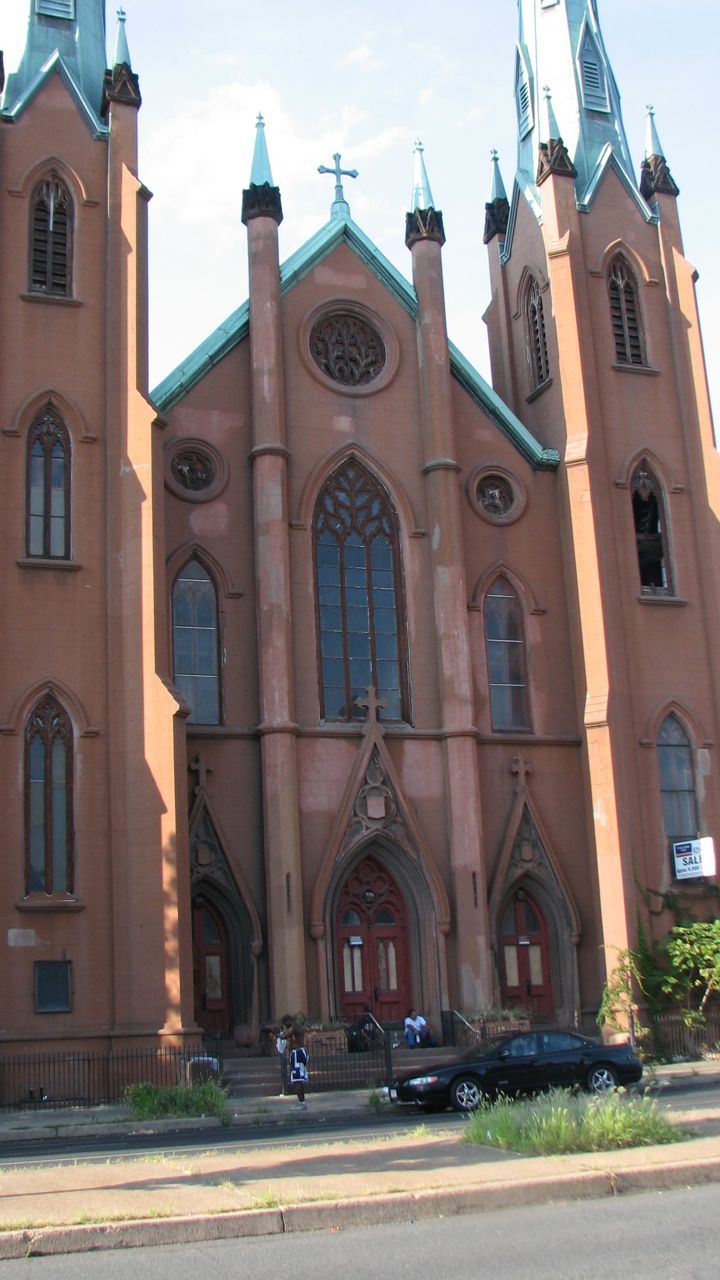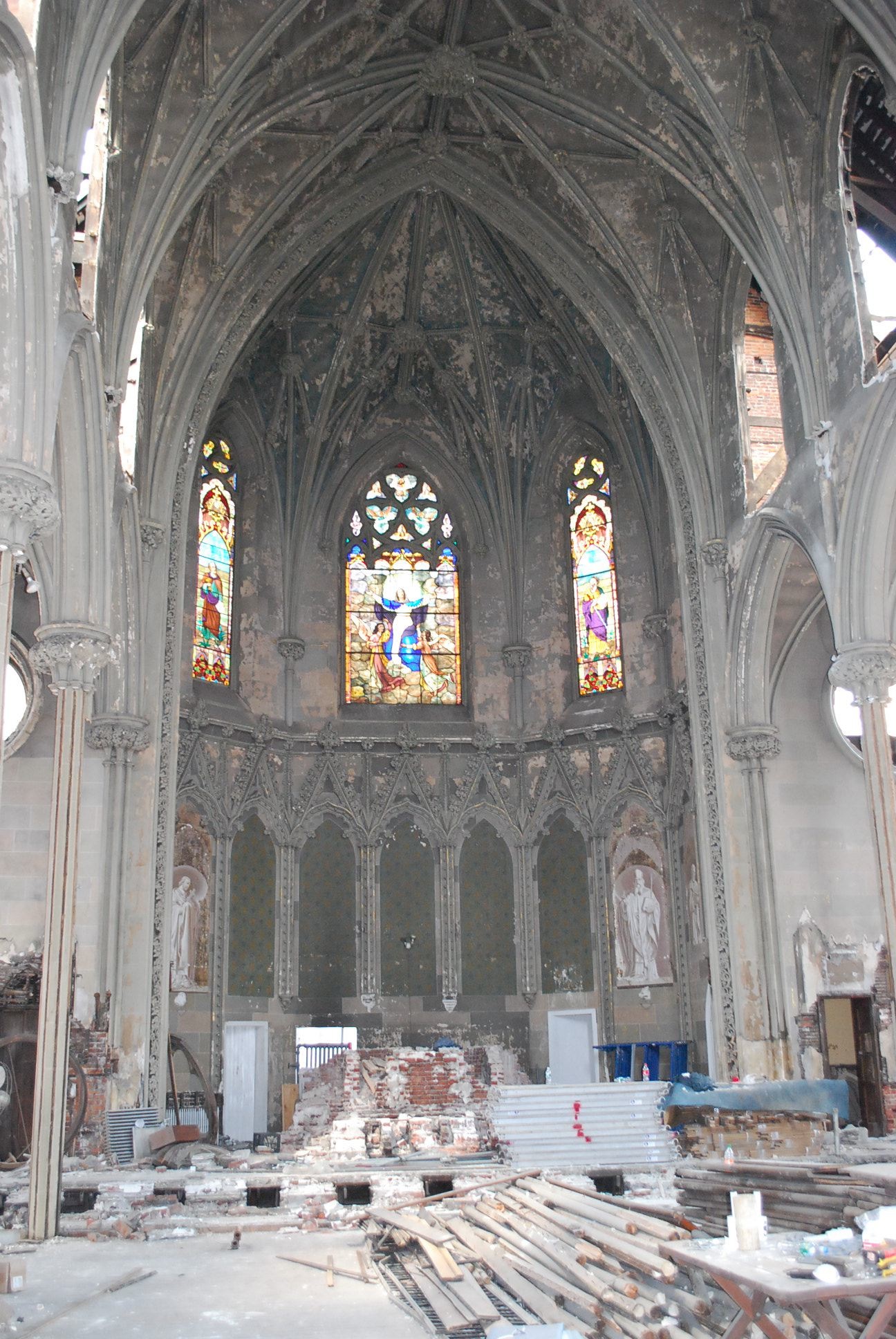Callowhill Neighborhood Association says Siloam hasn’t done enough to save historic church
It was the Callowhill Neighborhood Association’s turn before the Board of Licenses & Inspections Review Monday to try to stop the demolition of the historic Church of the Assumption.
In a sometimes contentious hearing that stretched four hours, the group tried to make the case that Siloam, the AIDS service agency which owns the Spring Garden Street church, hadn’t met the legal burdens required to win a hardship exception necessary to demolish a historically listed structure.
The agency hadn’t tried to advertise the building to potential buyers in a “broad manner” or made an adequate assessment of other potential uses for the building, according to John Gallery, executive director of the Preservation Alliance for Greater Philadelphia.
He said that neither Siloam nor its broker provided any documentation detailing the steps they took to find buyers for the building and that they were focusing on marketing the church to religious organizations rather than institutions like art galleries or housing developers.
Gallery also said that the group had only tried to sell the building for six months before it applied for a hardship exception, while it would probably take two years to find a seller for the building if it were in good condition.
(At this point, it’s uninhabitable because of existing code and building violations.)
Gallery further charged that Siloam had failed to perform an analysis the Historical Commission usually requires that would have examined the viability of adapting the building to another use. In contrast, he held up a thick binder that contained a 10-year economic analysis that was submitted to win a hardship exemption to demolish the Sidney Hillman Medical Center on Chestnut Street.
He also said that the agency had unreasonably required that any potential buyer have financing lined up to stabilize the property ― implicitly increasing the purchase price.
Amy Hooper, president of the Callowhill Neighborhood Association, said that “we were really caught off guard” by Siloam’s attempt to demolish the property and that a board member moved quickly to get the property protected by applying for historic certification.
She said Church of the Assumption was a “prominent gateway” to the Reading Viaduct, which the group wants to turn into a park.
“It really needs to be preserved,” Hooper said, adding that “the last thing we need [in the neighborhood] is another parking lot.”
The neighborhood association also brought in three people to testify about the condition of the building and its potential for reuse.
Timothy Duffield, a board member of the Clay Studio, a nonprofit ceramic art studio, said his group was interested in purchasing the church.
But first, it needs to conduct a three-month feasibility study and six-month financial study ― which it won’t do, he said, because “there’s a big truck parked around the corner [of the church] with a wrecking ball.”
Sam Harris, who works as an architect and structural engineer, said Siloam’s own assessments of the property found that it would cost $1.5 million to “stabilize” the building.
Harris said that it might be possible to “mothball” the church for as little as $150,000 ― which would prevent further damage and abate the violations, but not allow the church to be inhabited.
And Alex Generalis, a real estate developer and realtor who turned an old Manayunk church into an apartment building, said he was surprised by how little he knew about Siloam’s attempts to sell it.
“It didn’t seem to show up in places where it should,” he said, while arguing that the group hadn’t looked closely enough at ways of creatively financing any real estate deals with tax credits.
At the same time, lawyers for Siloam and the city sought to knock down the neighborhood association’s witnesses by pointing out that they hadn’t entered the building themselves to conduct structural analyses or emerged with a potential buyer.
(The city has intervened in the case because the Historical Commission voted to give Siloam permission to demolish the church and has argued that the L&I Review Board doesn’t have the power to reverse that ruling. A case concerning the Dilworth House is pending before the Court of Common Pleas that speaks to this question and could affect whether the board’s ruling has any impact.)
Assistant city solicitor Leonard Reuter and Siloam attorney Kevin Boyle became increasingly frustrated with the witnesses’ testimony, objecting to much of it as hearsay.
Reuter called Harris’ testimony in particular “speculation on speculation on speculation” because Harris was basing it on Siloam’s report on the church’s condition and he didn’t examine the inside for himself.
Generalis’ testimony particularly upset Reuter.
When board chairman Anthony Rabutino told Reuter to “not practice law here” in response to his repeated objections, Reuter shot back “God forbid.”
In their closing statements, both Reuter and Boyle talked about the financial hardship the church represents for Siloam.
“There’s nobody that’s stepped up to the plate,” Reuter said. While noting the building’s historical significance for Roman Catholics― St. John Neumann consecrated it and St. Katherine Drexel was baptized there ― he said the Historical Commission had rightly granted Siloam permission for demolition.
“Sometimes you have to let go,” he said.
Meanwhile, Sam Stretton, the attorney for the neighborhood association, argued in his closing that Siloam “have not met their burden of proof” to win a hardship exemption.
The L&I Review Board didn’t deliver a ruling at the end of the hearing, and Rubatino said the board would notify all parties when the commissioners are prepared to rule.
Regardless of who wins, the stage is set for further appeals.
Stretton said the neighborhood association would appeal a loss to the Court of Common Pleas, and both Boyle and Reuter were careful to note their objections to the neighborhood association’s witnesses in order to provide similar grounds for appeal should their side lose.
Stay tuned.
Contact the reporter at acampisi@planphilly.com
WHYY is your source for fact-based, in-depth journalism and information. As a nonprofit organization, we rely on financial support from readers like you. Please give today.





